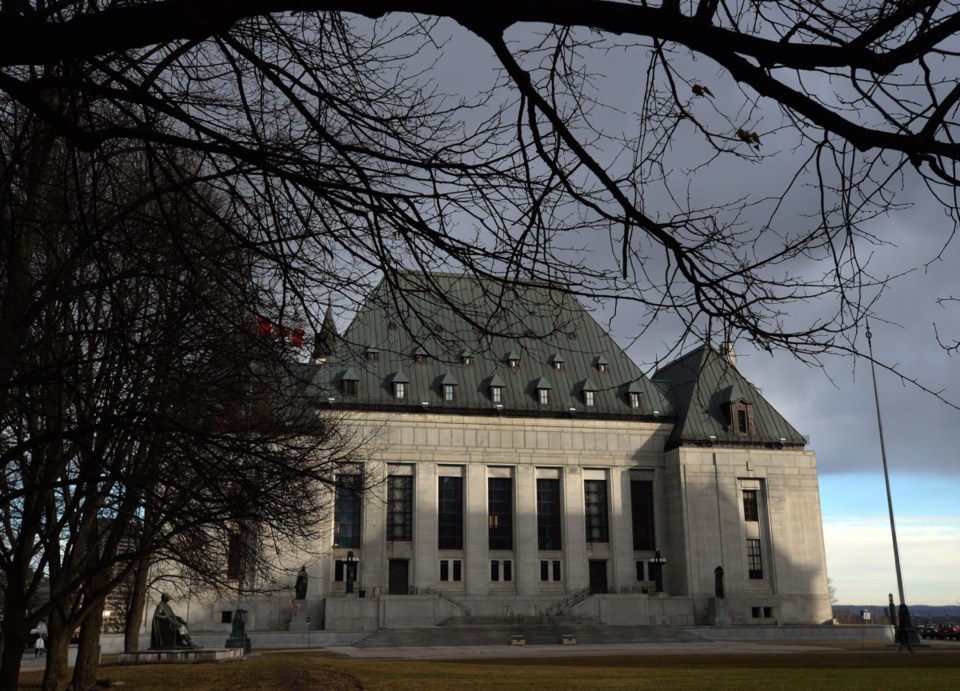 The phrase “laughed out of court” comes to mind, except the Supreme Court of Canada didn’t even bother laughing.
The phrase “laughed out of court” comes to mind, except the Supreme Court of Canada didn’t even bother laughing.
The justices scarcely even bothered explaining themselves. When the B.C. Teachers’ Federation’s 14-year battle with the government finally reached the last stop in the line, the court took barely 20 minutes to consider the case after arguments concluded. Then it delivered an oral verdict while lawyers were still getting their coats on, completely rejecting the B.C. government’s position.
The written reasons released later consist of two sentences, simply affirming that the BCTF’s appeal is allowed by the majority.
It’s as if the BCTF’s case was so overwhelming, they feel no need to explain their verdict.
If anyone wants a rationale, the court cited the views of one judge at an earlier stop along the way. B.C. Supreme Court Justice Susan Griffin had slammed the government and sided with the union. Then the Appeal Court reversed that decision.
But Appeal Court Justice Ian Donald dissented, for reasons that the Supreme Court of Canada has now found compelling.
Since the Supreme Court of Canada cited them, they stand as the final legal word on the matter. And Donald backed Griffin’s harsh view of the government’s moves. He said she was completely immersed in all the variations of the case for several years.
Appeal court judges can only second-guess trial judges when they make “palpable and overriding errors of fact,” and she made no such errors, he said.
He said the case wasn’t about a single government action, or the effect of a single statute.
“Rather, this case is the culmination of at least 13 years of systemic and institutionalized negation of the BCTF’s ... right to associate collectively to achieve important workplace goals.”
In 2002, the government permanently stripped working conditions, which involve a lot of the public-interest items such as class size and composition, from the contract and from future contract negotiations. After that was ruled invalid by the courts, it tried the same thing temporarily in 2012 during another education crisis.
Referring to the government’s position that it would consult with the union but insist that working conditions remain off-limits, Donald said: “In essence, the province was informing the union that it intended to keep the door shut on the subject of working conditions, but it would allow the union to have input on exactly what kind of door would be used.”
That door is now wide open, and the union will walk through holding all the cards.
When the time comes for the government and the union to “reopen negotiations,” all the teachers’ union has to do is push the two-sentence verdict across the table and wait.
There is no real comeback. The only negotiations will be over the size of the reparations bill. Rolling the clock back to turn-of-the century collective agreement provisions, after the government unilaterally stripped many of the contract items, is going to be an expensive proposition, measured in the hundreds of millions.
But money is only part of the bill that is due. Power is the other part of the equation, and the government is going to have to cede a lot of authority on critical education issues to the BCTF.
All the educational issues it has been deciding by itself are going to be on the table, up for discussion with a union whose 14-year grudge against the government has just been found to be perfectly justified. The union is likely to come out of this makeup effort with a lot more clout when it comes to working conditions.
Paying the bill can easily be spun as a positive, since the spending will be warmly welcomed. The government has some extra money put aside already. The upcoming Liberal election campaign is going to have to include a significant boost in school spending, enough for hundreds more school staff.
The banners will likely read: “We’re funding the biggest hike ever in education spending.” They won’t include the footnote: “By court order.”
But for a government that demolished education and health contracts on the same day in 2002, it’s the surrender of power that’s going to rankle.



